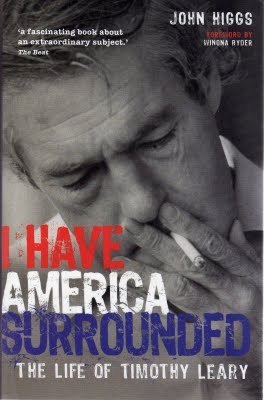Matt Rees's Blog - Posts Tagged "lsd"
I Have Publishing Surrounded: John Higgs's Writing Life

Thomas Carlyle wrote that “A well-written life is almost as rare as a well-spent one.” There may be some debate as to whether Timothy Leary’s life was well-spent. However, his biography by John Higgs is one of the most well-written and compelling books you’ll ever come across. “I Have America Surrounded: The Life of Timothy Leary” is an alternative history of the turbulent times that made modern America. Though it’s nonfiction, it reads much like James Ellroy’s hardboiled fictionalizations of the duplicitous reality behind the 1960s and 1970s in the U.S. Once you read the book and read this interview with John Higgs, you’ll understand why he was so attracted to Leary, the scientist who saw LSD as the answer to many of society’s ills and who ended up being called the most dangerous man in America by the FBI. No, not for the drugs (though one can’t rule that out….) Rather because John, an experienced tv writer and producer, is a man who doesn’t accept the idea that things simply have to be the way they seem to others.
Do you live entirely off your writing? How many books did you write before you could make a living at it?
I don't see living entirely off writing as a realistic aspiration in the Twenty-First Century, if I'm honest. It is still possible, of course, but the publishing model is in such a state of flux that only a wild and reckless gambler would wed their future financial security to it. The most significant factor, in my view, is that the amount of writing available to the reader has increased exponentially, and a sizable percentage of that is free. That alone changes everything, and threatens the writer with smaller, more fragmented audiences at best, or obscurity at worst. However, the cultural gatekeepers are also becoming increasingly irrelevant and you no longer need permission to go out and find readers. I'm delighted by all this. I love eBook readers, Print on Demand, profit-share deals with publishers and all the rest. I can't imagine a more exciting time to be a writer.
It's not the best time to be in the publishing industry, of course, as it undergoes a slow-motion nervous breakdown. The industry operates at such a 19th Century pace that if you killed it, it wouldn’t notice for eighteen months and then it would take another year to actually get round to dying. But even so, everyone can see that major, unstoppable structural change is happening. I have a hunch that in a few years time the writer-agent-publisher relationship will be start to be replaced by a writer-manager model, with publishing, promotion and distribution farmed out on a project-by-project basis while the manager concentrates on building a long-term readership for the author.

I'm not sure that everybody is prepared to be realistic about the changes that are happening. The idea of ‘writing books’ as a profession rather than a vocation, interest or even hobby is a very romantic one and people cling to it. Writers get very angry at the idea that no-one wants them to write enough to actually give them money to do it. Painters and, to some extent, musicians and actors are generally more realistic about this than writers, and also more realistic about why they do what they do. There's no reason why writers should be above working for a living - the likes of Philip Larkin or T.S. Elliot were prepared to do so. I think a big part of this is because the idea of using writing as an excuse to lock yourself away and withdraw from the world can be very seductive.
Of course, I like money. I like people giving me money, and I especially like getting money for something that I have written. But I think the writer/reader relationship is much healthier now, now that the playing field has been leveled, and if that means authors need to hold down a day job then that's a fair price to pay.
What's a typical working day?
There's no such thing as a typical working day, just as there's no such thing as a typical person or a typical philosophy. My writing life consists mainly of trying to find little two-hour windows where I can sneak off and furiously type away, without anyone giving me a hard time for doing so. You can get a surprising amount done using this method.
Do you have a pain from childhood that compels you to write? If not, what does?
I don’t know what compels me to write, but I don’t think it’s pain from childhood. My current best guess is that I write about things in order to lose interest in them. It is those things that don’t make any sense that I have a problem with. My brain is unable to digest them and they stick around, endlessly being picked over and prodded. Writing about them is the only way I know of flushing these buggers away, leaving me clear headed and hopefully a little saner.
Other writers have other reasons for writing but I don’t claim to understand what they are. Consider writer’s block, for example; being unable to write because you have nothing that you need to say. This sounds terrific to me. Imagine all the things you could do with the time! Yet other writers insist writer's block is a terrible thing, so presumably I’m failing to understand something somewhere.
How many books did you write before you were published?
My first book was published, but then I'm a lucky beggar. That said, of course, most of the stuff I write is scrappy nonsense which is written entirely for myself and shoved away in a draw and forgotten about. Only occasionally does it amount to anything that would interest others enough to justify the process of editing, polishing and all the business stuff involved in getting it published. I'm pretty lazy and would be quite happy not to have to go through all that, but it is important to be read and to have the contents of your head peer reviewed from time to time.
Who is the greatest plotter currently writing?
I'd say Steven Moffat. TV writers tend to be better plotters than novelists or film writers – at least, the really good ones are. Novelists have too much freedom and screenwriters are too restricted by the amount of people involved and the compromises that are needed when so much money is at stake. TV writers are in a middle ground where they have to hold a general audience but can't rely on big budget spectacles, so they have to get good at either plot or character, and preferably both.
Who is the greatest stlyist currently writing?
I recently read an unpublishable novella called 'The Nabob of Bombasta' by Brian Barritt, the English beatnik who you might remember from my Timothy Leary biography. I can only describe it as like literary wasabi. It is so wild and extreme that taking a little between regular literature wipes clean your mental pallette and allows you to approach your next piece with a fresh, unprejudiced mind. It is way beyond obscene and unacceptable, but it is so good-hearted, absurd and funny that anyone who claims to be offended by it is probably lying, and probably lying to themselves. Brian quite happily describes it as utterly unpublishable yet I hear it will be published next year, on Valentine's Day. Look out for that one!
What's the weirdest idea for a book you'll never get to publish?
You can publish anything these days, no matter how weird. The only constraint is whether there is an audience big enough, or interested enough, to justify your time. But as for weirdest idea, I sometimes hanker to re-publish the Bible in wildly unsuitable fonts, to see if it retains any credibility. Who wouldn't want a copy of 'The Old Testament in Comic Sans'?
What's the best descriptive image in all of literature?
That's an easy one. The best descriptive image in all of literature - better than "He Wishes for the Cloths of Heaven" or "Rough winds do shake the darling buds of May" - is Douglas Adams' "The ships hung in the sky in much the same way that bricks don't."
Plug your latest book. What's it about? Why's it so great?
Christ no - where's the fun in that?
Urinal-top video
 We were on the Hessian plain somewhere outside Frankfurt when I felt as though the drugs had taken hold.
We were on the Hessian plain somewhere outside Frankfurt when I felt as though the drugs had taken hold.Why am I paraphrasing the great Hunter S. Thompson? Because I endured an experience that Professor Gonzo could only have imagined in his wildest LSD frenzies. Something that made me feel I must be hallucinating, as if the Las Vegas of HST’s fear and loathing had come to me, cleaned up and waterless but every bit as insidious. What I saw was proof that we have no limits in our power to suck every last cent out of every possible human moment.
I was urinating. Into a urinal. At a rest stop outside Germany’s business capital. When I looked down, I didn’t see the accustomed maker’s logo. No, there was a video screen. About six inches across and four inches high. Bright, bright high-definition. Built into the top of the urinal. Advertising itself as the product of Urimat.com.
They’re insidious, these Urimat people, I tell you, brother urinator. They must’ve done years of research to assess exactly where males let their eyes drop when peeing. It’s not on your unit. No, because that necessitates looking at the disgusting mess of the urinal itself, the chewing gum and receipt papers and hairs, oh God the curly hairs. We look higher than that. But not so high that we must confront the wall in front of us, with its vicious graffiti and its smears of nose-booger.
We look right at the top of the urinal, we brothers in urination. And the bastards at Urimat thought: Why waste all that time, when men are looking at nothing? Let’s make them look at a housewife, scrubbing her kitchen and bathroom. Let’s make them watch as “The dirt goes, the aroma stays.”
Can’t you picture Baron Urimat now, in his boardroom overlooking Feldbachstrasse in Feldbach, Switzerland – for this is where they have their evil mountain lair – saying to his henchmen: “When they have their dirty little units in their hands, the path to men’s minds lies open. Let us feed this psychological emptiness. Before they put themselves back in their pants and walk out without washing their hands. Let us take control of their minds.”
Can't you hear the evil cackles of laughter even now?
Read the rest of this post on my blog The Man of Twists and Turns.<\a>
Published on October 07, 2010 06:20
•
Tags:
book-tour, fear-and-loathing-in-las-vegas, germany, hunter-s-thompson, lsd, professor-gonzo, travel, urimat



